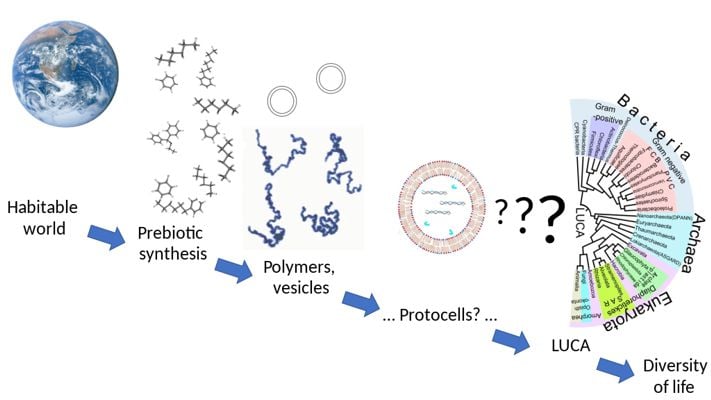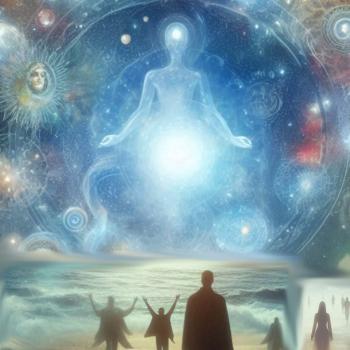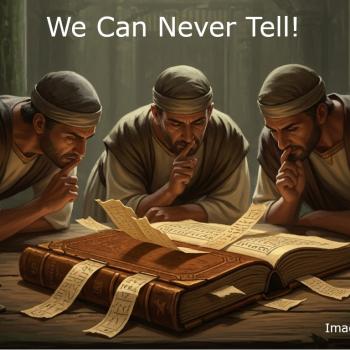The Big Questions series
Many religious people want to know what evolution is and does it conflict with Christianity or other religions. I don’t see a conflict there. We don’t know in any way how God created the universe and our world. We only know that God is the most likely cause that set it in motion. Science doesn’t have an explanation for “First Cause,” which caused it from the very beginning.

Image Origin of life stages by Chiswick Chap on Wikipedia_CC40
Evolution is a theory that describes what scientists think they see in the historical record in archaeology, of the development of life forms and species. The theory is in slight contrast to the observable phenomenon in physics of entropy. It’s a curious phenomenon why life developed in spite of entropy working against it.
Evolution and entropy
Entropy is a measurable physical property that is most commonly associated with a state of disorder, randomness, or uncertainty. Entropy is also about the availability of energy and energy processes, and in simple terms energy is not destroyed. Entropy predicts that all things move toward disorder. Left unchecked disorder increases over time. Energy disperses, and systems dissolve into chaos.
In contrast, life seems to move in the direction of order and is constantly refreshing energy in its system. But in other life processes, such as sociology, entropy is observed: “Without constant maintenance from individuals and dominant institutions, societies tend toward chaos. Divergent behavior escalates — a concept known as the “broken windows” theory.”
Perhaps we are currently seeing this in the US and other nations as people seek simple explanations for life and push our understandings of government to favor extremes in behavior so that things like science and normal order are disbelieved or destroyed.
Evolution is not why
Evolution and scientific theories don’t get involved with the “why” behind the process. Science simply describes what it thinks it sees. In the case of particle physics science is always looking for deeper answers regarding what exists. In the case of astronomy scientists are always finding new things about our universe and coming up with new theories about how it is organized. Fun stuff.
Entropy may even be seen in such fields as psychology and sociology, but nowhere in science is found an explanation for why the universe was created, why people evolved, and any explanation of purpose. Scientific theories tend to emphasize that the universe has always been and simply collapses and begins again. Science has no clue as to purpose.
Evolution – maybe
Scientists see examples of evolution in nature. It isn’t simply adaptation in which some important feature of a life form may increase or decrease to challenges, such as sperm counts getting lower in men. Evolution is seen in important new features of the organism that are caused by mutations in DNA.
Darwin, who came up with the Theory of Evolution from his multitudinous observations of nature, proposed the idea of Natural Selection. Some mischaracterized this as the strongest organism wins and survives as a brutal battle in nature that is reflected in the business and sports worlds.
Instead what is seen in the natural world is that there generally is a genetic variation in offspring and that the most adaptable to new conditions are the ones who survive. Those that develop natural resistance to changing environmental conditions such as predators, parasites, and destructive pathogens (bacteria, fungus, virus, etc.) helps some within a species to endure and survive.
Yes, we do see evolution occurring in the natural world around us, such as in plants, and we can do the same in the laboratory.
Building life
I worked for a while with equipment that could synthesize DNA from nothing. It’s a process of adding the right chemicals together, and then adding buffers to prevent other reactions, then doing it again and again to form a complex chain: DNA. I often bumped elbows with scientists who could cut and splice DNA to transfer desirable characteristics from animal to animal and plant to plant.
It isn’t difficult for me to see that life could evolve in the right conditions. While most mutations are harmful to the life form in which they occur, a very few are helpful and help the evolved lifeform survive.
When the Earth was very young, many chemicals existed in the primordial stew that was earth. It was heated by the Earth and by the sun as catalysts and fuel for reactions. Lipids developed in which chemical chains could live within their walls. With more complexity replication developed. Energy is received and transformed from the environment in which they exist. Abiogenesis looks at this.
Why, why, why?
Why did this occur? Who dreamed up this stuff? For what purpose? Science doesn’t necessarily plague itself with those questions. People do.
The Bible says that God created the Earth in a day and that a day might be like a thousand years to us (2 Peter 3:8). A thousand is metaphorical, not a real period of time. To our perspective it took a long time for God to create the Earth. And if God used evolution, then it likely happened in a period of time that was unfathomable to ancient people.
Numbers in the millions could not be conceived of by the ancients. The Dogon tribe of Africa and the Mayans could possibly have conceived of events that transpired over a hundred thousand years, but that’s it. The word million developed in the late 13th Century when people began to need it. Telling the ancients that God created the world over a period of millions of years would been impossible and have served no purpose.
The Bible is not a science book. We get in trouble when we try to use ideas that were described for ancient people as literal. Many ideas presented in the Bible are largely figurative – metaphorical.
Genesis 1 and 2 in the Bible are best seen as descriptions of the process of evolution guided by God. For ancient people with no understanding of the process it’s a reasonably accurate description. It starts with the formation of the solar system, the planet, and builds from simple life forms to more complex ones. In simple terms there is hardly a better description of the creation of solar systems, planets, and the evolution of life forms for people with incredibly limited understanding.
Takeaway
When someone says to me that science and religion differ about the development of life, I find that the statement that lacks inner integrity. Science looks at physical things and describes processes in physical terms. Religion isn’t science and describes things in terms that are understandable to people at a point in time and looks more at the why, at purpose.
The perceived conflict in people’s minds is about two fields that don’t overlap creating explanations that don’t overlap, but people don’t understand that they can’t overlap.
________________________
The standard of belief and conduct for Christianity is love. God is love. We’re asked to be like God.
________________________
If you find these articles intriguing, please consider joining the mailing list.
If I’ve challenged your thinking, I’ve done my job.
___________________
Our answer is God. God’s answer is us. Together we make the world better.
– Dorian












